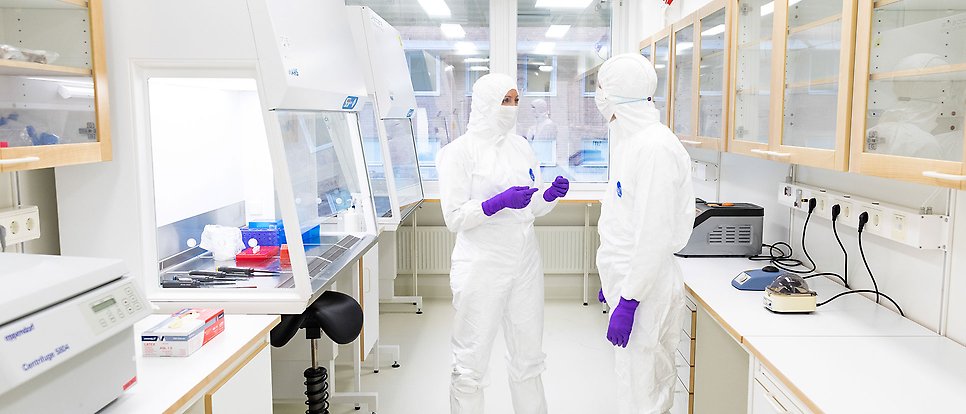Five centres of research excellence at Uppsala University

Centre for Human Prehistory is one of the research environments that will receive grants. Photo from the Ancient DNA Lab in Uppsala. Photo: Mikael Wallerstedt
Five research environments at Uppsala University will receive grants as part of the Swedish Research Council’s excellence initiative. They include innovative research into the Viking Age, life chemistry, geometry and physics, extreme climate events and human prehistory.
During autumn 2022, the Swedish Research Council issued a call for grants to centres of excellence. Following an international panel’s review of the 124 applications received, the Council has now decided to fund 15 research environments. A full five of these are located at Uppsala University, which will receive total funding of SEK 145 million.
Each research environment will receive SEK 4–6 million per year for five years, and the plan is to have the option of a further five years following an evaluation. The following research environments at Uppsala University will receive grants:
- Centre for Geometry and Physics – Tobias Ekholm, Professor of Mathematics
- Centre for Human Prehistory – Mattias Jakobsson, Professor at the Department of Organismal Biology
- Chemical Mechanisms of Life – Ingela Lanekoff, Professor at the Department of Chemistry – BMC
- Centre of Excellence on the Effects of Extreme Climate Events – Gabriele Messori, Professor at the Department of Earth Sciences
- The Viking Age World – Neil Price, Professor at the Department of Archaeology and Ancient History
Centre for life chemistry
One of the research environments awarded funding is a centre at Uppsala University at which researchers will be able to combine knowledge within individual fields to gain an in-depth understanding of what is described as ‘life chemistry’. Researchers will be able to study the chemical mechanisms that control the circadian rhythm, for example – is it really individual hormones, and if so, what is the reason behind their increases and decreases? It will also be possible to study chemical interactions at a detailed level, to understand what governs the development of cancer.
The centre will hold seminars and workshops, as well as courses for students and doctoral students, with the aim of creating a Master’s programme in life chemistry. A platform for combining data from different molecules and techniques will also be developed. The idea is for the centre to function as a hub within a research structure that allows researchers with different backgrounds and expertise to locate collaboration partners across traditional subject borders.
Grants to centres of excellence
- The Swedish Research Council has now decided to fund 15 research environments with great potential to produce innovative research.
- Each research environment will receive SEK 4–6 million per year for five years, and the plan is to have the option of a further five years following an evaluation.
- The funding is to be used for long-term programmes in which researchers from different disciplines focus on a theme or a question. They will then build up a centre for research and educational activities around that area.
